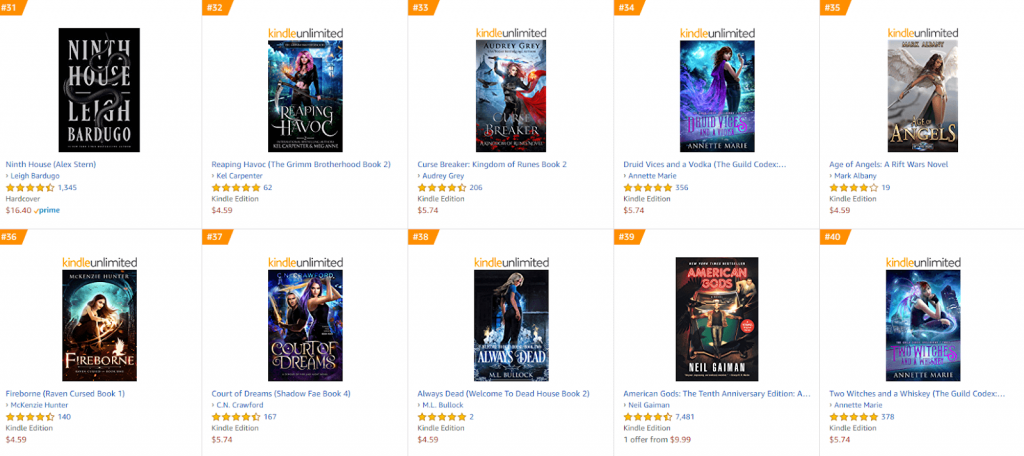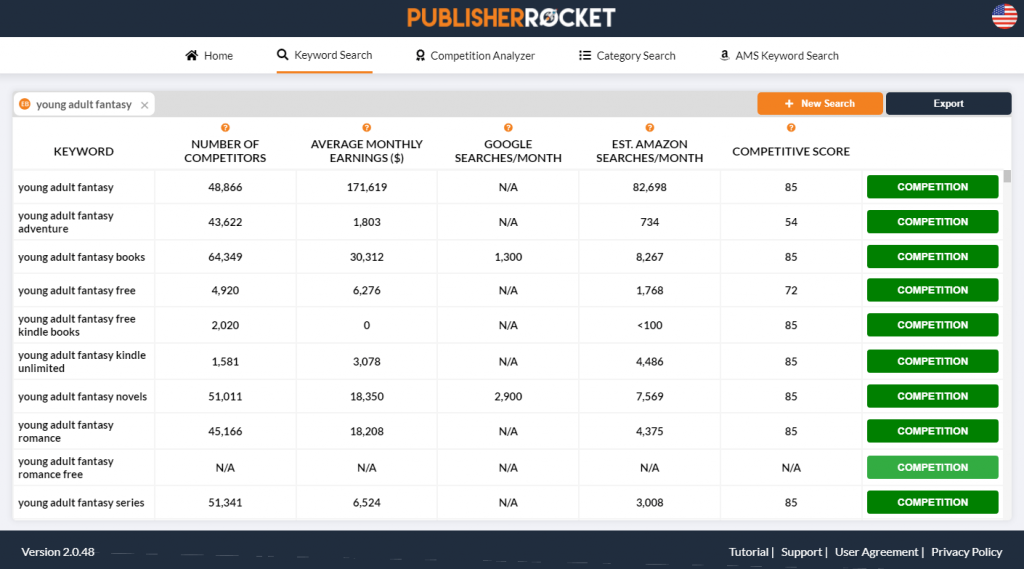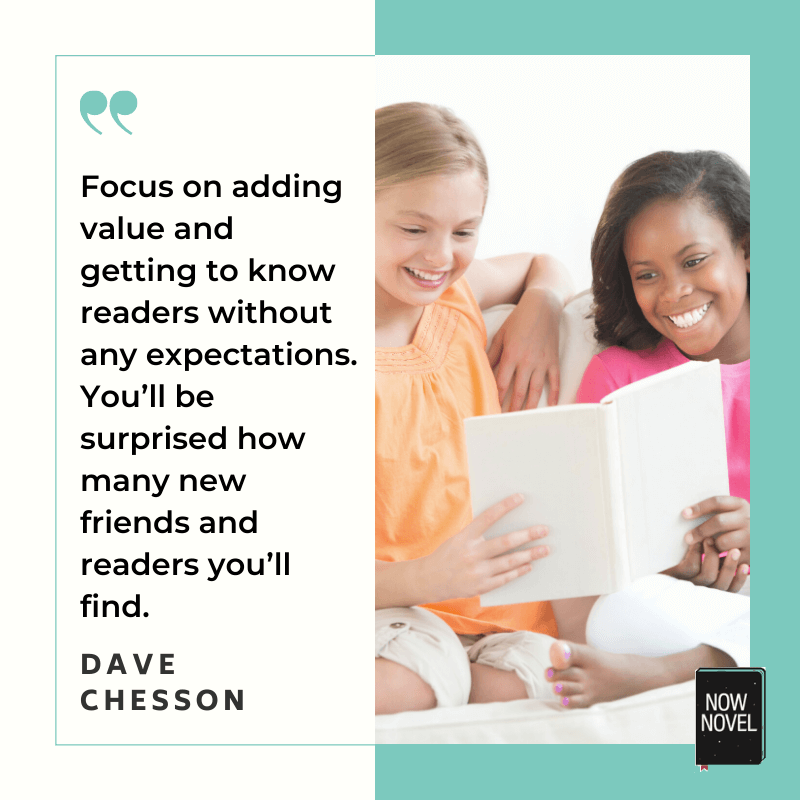[This is a guest post by Dave Chesson, founder of Kindlepreneur – Ed.]
Marketing your book doesn’t have to break the bank or burn a hole in your pocket. As a starting author, or just one who needs to save some money, marketing on a budget is a must — not a choice. Let’s look at 10 of the best book marketing strategy tips for authors working on a budget.
Note: Many of these choices are absolutely free, but there are a few options that will require some money–just not a lot of it.
10 steps to market your book:
- Get your cover right
- Rewrite your book description
- Research effective keywords
- Join Facebook groups
- Build a mailing list
- Join StoryOrigin
- Try Bookfunnel
- Try going live
- Set Lower CPCs in your Amazon ads
- Use Facebook ads to build your mailing list
1. Get your cover right
The best book marketing step you can take early is to get your cover right first.
This means researching your genre and checking out the covers bestsellers are using.
Take a look at the young adult category on Amazon for instance:

You’ll notice that most of them feature certain elements like a girl on the cover, magic, and similar color themes.
If you were to write a book in this genre, I’d suggest your cover look similar to these because that’s what readers expect.
2. Rewrite your book description
If you’re not getting loads of sales, take another look at your book description.
Apart from your cover, it’s the first thing a potential buyer sees when they click on your ad or get onto your book’s sales page by other means.
If your description doesn’t draw readers in, they’ll click away without giving the book a second thought. And that means your marketing dollars will be wasted.
You can learn useful tips on how to rewrite your book description in Bryan Cohen’s book How to Write a Sizzling Synopsis.
3. Research effective keywords
If you want to level up your Amazon ads and get more exposure on Amazon’s platform, you need to do effective keyword research.
That means finding keywords readers are actually typing into Amazon’s search bar. Here’s an easy guide on how to do just that.
It’s a pretty involved process. You’ll need to type in a given keyword and several variations of it, then write those keywords down and check how competitive they are, in a tool like Google Ads. It takes a while, but it definitely pays off.
An easier approach is to use Publisher Rocket, a software I created that allows you to get keyword results within seconds.

4. Join Facebook groups
Joining reader Facebook groups for your book’s genre is a great way to meet superfans.
It’s an awesome research tool and one of the best book marketing strategies. It will make it much easier for you to connect with people who enjoy your books.
However, don’t go into these Facebook groups and promote your book straight away.
Focus on adding value and getting to know readers without any expectations. You’ll be surprised how many new friends and readers you’ll find, and how it will help your book sales.
5. Build a mailing list
The best book marketing tool you’ll ever have is your mailing list.
Once you’ve collected emails from readers who love your work, you’ll have fans to support your future books.
Platforms and retailers may rise and fall, but you’ll always be able to drop your loyal readers a line to grab your next book.
To build your mailing list, you’ll need a reader magnet (a freebie to give away) and a plan to contact them regularly.
Check out Tammi Labrecque’s Newsletter Ninja for more on how to do this successfully.

6. Join StoryOrigin
StoryOrigin is a completely free platform that allows you to distribute your reader magnet and arrange newsletter swaps with other authors.
Newsletter swaps are when authors agree to promote each other’s books to their corresponding mailing lists.
They’re a great marketing tool for exposing your book to another audience that is hungry for it.
Naturally, you’ll want to only swap with authors in similar genres. If you write epic fantasy, you won’t benefit much from partnering with an author who writes mystery books for kids.
With StoryOrigin, you can organize swaps like this and build your mailing list with ease!
7. Try Bookfunnel
Bookfunnel is a paid platform that allows you to join mass promotions with other authors.
It also allows you to upload ARC copies of your book and put up reader magnets for finding new readers as well.
It’s a fantastic platform that will cost you from as little as $10 a month.
8. Try going live
When you feel like your marketing efforts aren’t getting you anywhere, it might be time to diversify.
Going live and connecting actively with your readers, whether it’s on Facebook, YouTube, Instagram or Twitch, is a great way to get the word out about your books.
The more you do it, the more traction you’ll gain!
9. Set Lower CPCs in your Amazon ads
If you find that you’re spending too much money on your Amazon ads, lower your Cost Per Click (CPC).
Of course, you don’t want to make it so low you never get any impressions, but there are plenty of authors who get clicks for relevant keywords with CPCs as low as 15 cents.
Give it a try and you might be shocked by your results.
10. Use Facebook ads to build your list
As you can probably tell, I’m a big fan of author’s building mailing lists.
The easiest way to do this is by creating lead ads with Facebook–with just a $5 budget per day, you can pull in up to 20 leads.
While you won’t be driving traffic directly to a book sales page, you will get more for your money. Every lead you add to your mailing list is a potential superfan who might buy all of your books!
Final thoughts
With these 10 best book marketing tips, you’ll be able to market your story without worrying too much about the cost. Do your marketing right, and you’re likely to see an upswing in your book sales.
About Dave Chesson

Dave Chesson is the creator of Kindlepreneur.com, a website devoted to teaching advanced book marketing which even Amazon KDP acknowledges as one of the best by telling users to “Gain insight from Kindlepreneur on how you can optimize marketing for your books.” Having worked with such authors as Orson Scott Card, Ted Dekker and more, his tactics help both Fiction and Nonfiction authors of all levels get their books discovered by the right readers.

